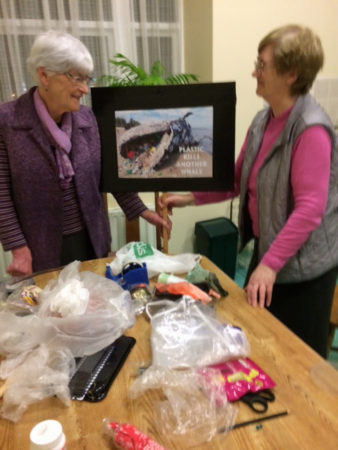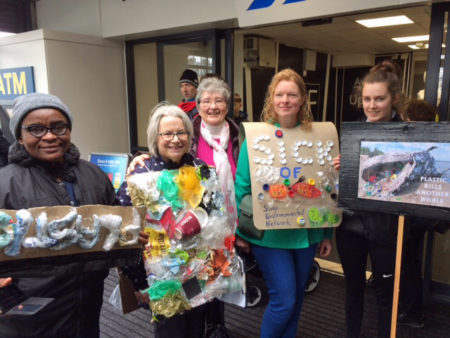Sligo, in the North West of Ireland, is a county of stunning beauty, scenic mountains, cascading waterfalls and over 190 km of coastline with some of the most beautiful, beaches in Ireland. But Sligo has a hidden problem-plastic. Our beaches are polluted with plastic; our larger marine fish are dying of undigested plastic tubs, bags, and bottles; the stomachs of smaller marine fish are lined with micro-plastic.
 Kathleen Conneally and Patricia Tomlinson view the plastic contents of a whale’s stomach
Kathleen Conneally and Patricia Tomlinson view the plastic contents of a whale’s stomach
We, the Sisters of Mercy in Sligo, have been concerned about this issue for some time now. On April 13th we had no hesitation in getting involved in the Sick of Plastic Campaign, established to encourage Supermarkets to reduce plastic packaging. The campaign, organised nationally, was run in Sligo, by Sligo Environmental Network of which some Sisters are members. Some of us made banners, others collected signatures, some stood outside Tesco Supermarket encouraging customers to leave their plastic packaging in the store, all Sisters signed the petition. The Campaign collected almost a thousand signatures in Sligo.
 Demonstration held in Sligo on the issue of plastic pollution
Demonstration held in Sligo on the issue of plastic pollution
On May 10th members of the National Environmental Network presented Tesco’s Social Responsible Team with over 21,000 signatures. They also highlighted areas where their stores could improve on reduction of plastic. Tesco presented the group with its Little Helps Plan – its programme to reduce plastic packaging considerably by 2025. The campaign is working. But we have still a long way to go. We are keeping the pressure on by, when shopping, continuing to ask supermarkets to reduce their plastic packaging, and by bringing our own non-plastic bags and containers. One area where there has been a noticeable improvement is in the fruit and vegetables section of supermarket stores: more fruit and vegetables are left loose or placed in cardboard containers.
One of the members of our Sligo Environmental Network group is Shane McCrann, a man with a young family, who is an inspiration to us all. Deeply concerned about plastic pollution he set up the Sligo branch of Aid the Ocean without government funding or any other funding. To date, with family members and volunteers he has organised 8 beach-clean-ups in the Sligo area collecting 1.75 tonnes of plastic. Among the items collected were dirty nappies, gas cylinders, car bumpers, garden tools, tyres, cans, tubs, bottles, and more bottles! He is an example of the power of one person. By doing his part to maintain the health of our beaches and of the fish we eat, he encourages the rest of us to reduce our own plastic use as well as to keep up the pressure on our local shops to reduce their plastic packaging.
Kathleen Glennon rsm
Western Province


